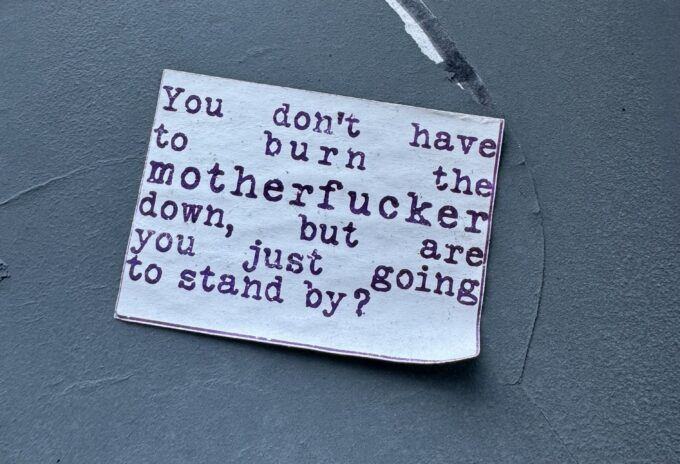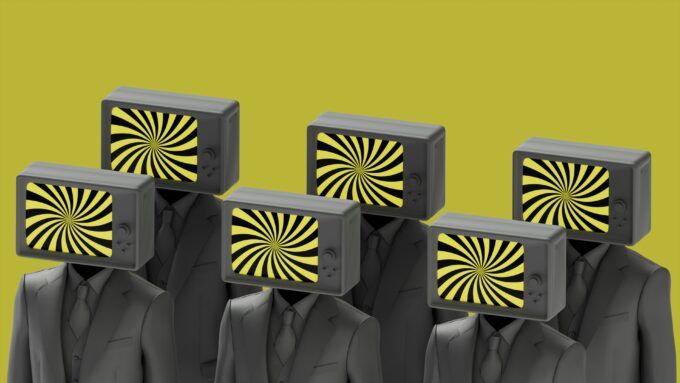
Divisiveness and Beyond
Published on http://www.counterpunch.org
Divisiveness
“Narrative,” the word, is in its political heyday. Politicians need to assert their narrative before their opponent does it for them. They need to change it or find it or test it or deny it. We live in an angry jousting of competing narratives, each seeking to crush, scrunch, destroy and annihilate the other. But not by old fashioned empirical and rational methods in the sciences or direct and circumstantial evidence in the courtroom.
Justin E.H. Smith in Irrationality: A History of the Dark Side of Reason describes the point at which our current arena of competing narratives reached after the Trump election, an election which meant “the near total disappearance of a shared space of common presuppositions from which we might argue through our differences.”
That space which was formerly shared is now a gazillion spaces in cyberspace, some briefly colliding in social media, most totally oblivious of the existence of other spaces.
We are all now in our own cubicles of truth and reality.
Narratives are either engaging to scale or they’re not. Is there a Democratic candidate who will be as engaging on stage as Donald J. Trump? Are Elizabeth Warren’s many plans for many things as engaging as one thoughtless tweet of our president? Does critical reasoning influence us or do social media “Influencers” now own that space?
The medium is the message as McLuhan told us, having no premonition that the messaging would decamp from reality to a hyperreality in which so many simulacra replaced whatever was meant by “messaging.”
Way back in the 20th century, the pragmatist Richard Rorty gave up on philosophy’s path to the Truth, and so for him Truth became whatever his contemporaries let him get away with. We are in that space now regarding establishing to everyone’s agreement any notion of truth, but we are way beyond it regarding anyone having any contemporaries in a recognizable societal sense whose existence Rorty presumed. Thus, the truth in your corner of cyberspace is always what your contemporaries there let you get away with. Otherwise, you wouldn’t be there, and they wouldn’t be there. A gazillion other cyber corners are equally inhabited.
Such a “to each his own bubble” state of affairs does not a society make, nor, a culture, that whole way of life out of which an imagined community emerges, as Benedict Anderson described.
How then to continue to keep our republic, a task Benjamin Franklin placed upon us?
Because we are now closer to both a corporate capitalist state as well as a market fundamentalist one, both protected by our cybertech surveillance of our minds and our behavior, both displacing liberal democracy with plutarchy, we can say that we haven’t kept our republic. And, unfortunately, a second term for Donald J. Trump will seal the deal on any possible retrieval.
If some shared imagined community out of which a functional society could emerge, that culture would make retrieval possible. But, again, unfortunately, the transformation of what were previously arguments recognized and understood, briefs, cases, positions grounded in facts offered as evidence are now all “narratives” seeking not to prove themselves but seeking only engagement, the kind of “Like/Emoji” engagement that the hyperreality of cyberspace is built to provide.
It has become increasingly clear that our millennial times are fully loaded with the undecidability, indeterminism and over-determination of our narratives, our truth stories. Our post-truth times caricature basic precepts of a primer to postmodernity, the key figures of postmodernity, from Lyotard and Barthes to Baudrillard, Derrida, Foucault and Benjamin, who retrieved the dark suspicions of early and late modernity to be found in Nietzsche and Heidegger. This undermining of traditions of rationality seems already to have gone through a whole life cycle: birth, maturity, death, all before it went to scale.
This mindset jump flooded the practices and feelings, the habits of everyday life without any thoughtful gestation. We were all someplace in our hearts and minds and then suddenly someplace else, some place where there was fake news, alternative facts, and no longer reasoned views but narratives. We got here but we don’t know how, although foundations of truth and reality have been eroding since the Sixties.
One of the swerves from modernity that postmodernity made was linguistic: words connected to world in no determinate way but floated within a cultural surround that brought them into signification. Words on one page would not remain captured there but could range on a terrain of all previous connections with world. James Joyce had referred to such intertextuality as “portmanteau,” as if each word was like one of those old travelling trunks plastered with stickers of places one has already been.
One wrote and spoke defensively under such conditions in a struggle for a fixed, unarguable connection between signifier and signified, word and world, a struggle doomed to failure as words themselves “floated” quite naturally outside such enforcement. Thus, such attempts at cementing meaning in place were subject to a deconstruction, a pointing out at what points words had flown the coop, had escaped our attempts to hold language to a reliable relationship with world.
I present this one example of the postmodern turn because it’s made the headlines during the impeachment of President Trump in the form of a transcript of a phone conversation which he has repeatedly pronounced “perfect” and the House Intelligence Committee has found so far from perfect that it merits impeachment.
Vice President Pence, in an interview, urged everyone to read the transcript and see for themselves how “perfect” it is. That signifier itself –“perfect” – certainly wanders in a funhouse of signification. Given the charges made that the phone call was an abuse of power, I suppose “perfect” was to mean “innocent.” Still, what we have is half the country reading those words and finding no crime and the other half reading the same words and finding enough crime to impeach. What words mean in any certain way has left the country.
But why? In a postmodern view, words don’t mean just anything but rather mean within a context, a surround, say, a culture which itself has a hierarchy of how anything means, priorities in every category from moral and political to familial and personal. If that bed of recognized and accepted meanings and values divides and then like a cell divides again and again, then a shared core of values and meanings fracture because the milieu from which they emerge fractures.
Words can float anywhere within a clime but always within an already existing hierarchy of talk, of stories, of truisms. Reliability of meaning lies within that. When the clime so changes that there no longer is a commonly recognized and accepted imagined core of what is reasonably the case, and that case made via reason, then we are certainly in a world in which one transcript can be called perfect by some and criminal by others.
In brief, we can write and talk within bubbles of how everything means to us while down the road a piece other people are living within different bubbles of how everything means to them.
We are no longer on the same page, so to speak, and being on the same page is crucial to achieving a common understanding.
What the postmodern mindset assumed was that how we realize, or, literally, make things real to ourselves personally would be forged within categories and conditions outside ourselves, including the conclusions of science. The “I” is already a fabrication of what things we are born into already are. Chaos and anarchy, a completely unleashed subjectivity, did not arrive with the postmodern.
However, none of the checks and balances to such chaos has taken root in our post-truth age because we are astoundingly attached to the illusions of individual autonomy and personal freedom to choose. We now defend ourselves against those truisms that oppose our own by merely asserting the authority of our own personal determinations. Others may have opposing opinions that bind them as if they were truths, but they cannot affect in any way the supremacy of our own personal freedom to design and live within a reality we like, confirmed by the truisms supporting that reality.
What the postmodern did not foresee was the movement of conditions of reality from the offline world to the online world, a movement in which the checks and balances of the real world collapsed into domains of realizing, sites of word and world connections, which are self-validating without outside scrutiny or deconstruction.
In brief, once again, cyberspace created a space within which all personal discoveries of reality and truth could flourish without being denied or eliminated by what is traditionally referred to as the Western Conditions/Canons/Methodologies of Truth, Reason and Reality.
Foundations didn’t vanish and thus destroy the fabric of reality and truth but rather they multiplied, every tweeter standing on self-made grounds, every word meaning, in Humpty Dumpty fashion, what “I say it means.”
“The near-total disappearance of a shared space of common presuppositions” was not then created by Trump’s election to the presidency but rather existed before and he brought to national scale.
In a culture deeply devoted to the personal and not the abstract, to engaging celebrity and not ideas, which is the bane of our politics, the turn from all manner of authority to opinion was sealed by Trump’s ascendance. He dominates not as a prophet of new meaning in the world but as a rebel against what stands as obstruction to personal meaning. His scorn and rejection of a resident order of things, substituting his own whim and will in its place, performs those acts of scorn and rejection that his admirers feel.
Cyberspace and Trump facilitated and accelerated a fracturing already well underway not by a heterodox postmodern assault but by a liberal meritocratic capitalism by which a “liberated”/predatory financial sector operating under the aegis of the efficient market hypothesis made law knocked labor and wages out of contention for an equal wealth share.
The Federal Reserve reports that in “2018, the richest 10% held 70% of total household wealth, up from 60% in 1989. The share funneled to the top 1%’ jumped to 32% last year from 23% in 1989.The increase in the wealth share of the top 10% came at the expense of households in the 50th to 90th percentiles of the wealth distribution.”
Some semblance of a culture of common presuppositions was already fractured by an economics upholding the play of the market as a fulfillment of rational expectations and government as an intrusion and obstacle to that fulfillment. Rational Choice theory turned out as screwball as Voodoo economics.
Globalization, ironically, has contributed to this fracturing of society as it has made possible, by computer, control and surveillance of both workers and productions beyond a brick and mortar site, a “growth” that has created market frontiers of investment and shareholder wealth, further pushing a wealth divide to Grand Canyon proportions.
A precariat class developed, insecure in income and employment, frustrated by such, aware that such precarity did not exist in the previous generations, feeling cheated but not able to point to how or by who. But most consequentially, this class has set itself against an order of things that has obviously left them in such an immiserated state. They are scornful of any authority set above their own.
Donald J. Trump mirrors the condition they find themselves although ironically, he’s the Judas goat leading them to even greater destruction. But both Trump and his followers are enveloped within an order of meaning in which truth was not absolute and universal, that things do not abide in words and words in things, that we make those connections between word and world, that we say what the truth is and that saying is ours, not divine revelation, that saying is always inevitably someone’s, someone positioned somewhere and at some time.
You can be born into the milieu of a pre-revolutionary France without being aware of Diderot and the Encyclopedists. Time and place affect regardless of our personal awareness or choice. But what is required is a space available to all, call it The Great Outdoors, or Objective Reality, a single, indisputable platform within which all can be affected and become aware.
That space no longer exists in an unchallenged way. A chaos of voices sound in cyberspace, an alternative reality; a national space fractures into economically unsustainable spaces for many; and the Master Voice of a willful, blind man fixes reality and truth for us.
Beyond
We need to find a path within a furor and ferment unresponsive to any approach, including dialectical, to relief.
There are two aspects of our postmodern/post-truth swerve that are very much a part of the hysteria of our disordered clime: the futility of establishing a Master Narrative that centers all narratives, and the relativity of all narratives to their surrounding conditions,
Trump is a center that cannot hold because he himself is internalized disorder, a disorder that has no center beyond greed, blind ambition, vindictiveness, and ego, which means that he can only take a path to his own destruction.
To get him out of office then is to leave him in office until he self-destructs, most likely by efforts to punish all the sick, bad, crooked villains that occupy his brain pan. Colossal ego will push him to punish all those who obstruct his own will. This may happen after the Senate exonerates him and will certainly happen if he wins a second term as president. A true madness unleashed.
Within our postmodern/post-truth world of masterless voices, Trump’s Master Voice has no authority beyond what those filled with illusions grant him, illusions he cannot fulfill except by bund rally bombast. Altering the framing of such illusions, the conditions on the ground which fertilize such illusions, de-authorizes Trump’s voice.
Regardless of how crowded our battlefield of contesting narratives may be, they can only thrive within the bubbles of reality from which they emerge, these “ways of knowing” not our original creations but culturally derivative.
History records the few who have thought originally. Our heads are filled with what we have heard, read and seen, matter that can change as culturally dispositions and priorities change.
For example, if God, Guns and Gays encapsulates a reality frame, a lens of seeing and knowing, it may burst when Flood, Fire, and Food become a real-world contest that cannot be ignored. We are very close now to accepting that those surrounding conditions will force our personal reality constructions to adapt. When narratives offering meaning are endlessly countered by other narratives offering different meaning, we can regain our reason and our sanity by change in the forces out of which our narratives occupy us.
Even closer still will be a revolt of the precariat, those living on the precarious edge of survival, both mentally and physically, whose presence shape a surround that forces recognition and thus eliminates and replaces so many truth story fabrications we now live within. New Tech, New Patents, New Products, and Profit to Shareholders, as well as Dividends and Algorithms would be bubbles burst by Security, Sustainability and Survival.
I say closer still because Trump is self-programmed to enflame all those conditions that have brought so many to a world of immiseration. He is, thus, ironically, himself a condition through which we can regain some semblance of a culture of common presuppositions and common purpose.














